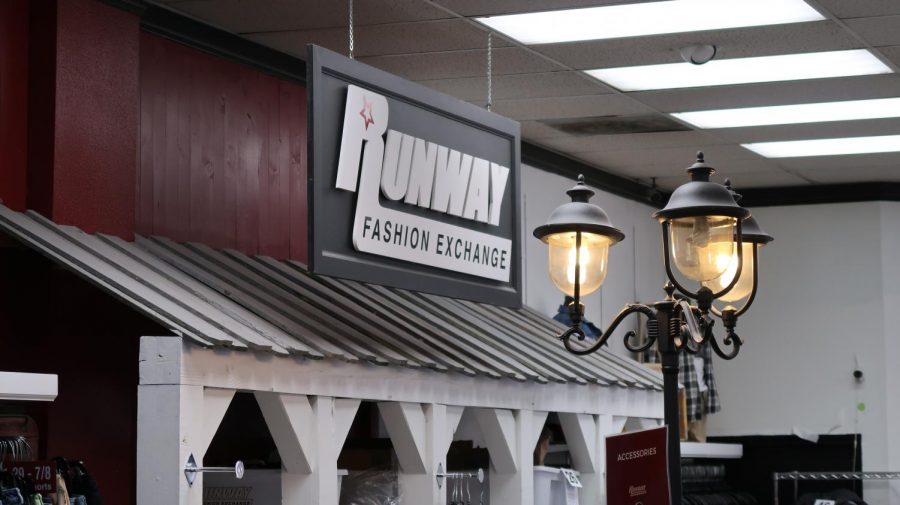There is ‘light at the end of the tunnel’ for local businesses amidst budget cuts, worker shortage
The Runway Fashion Exchange located in downtown Corvallis, Ore. at 264 SW Madison Ave. The business has had to close down its basement where it housed its men’s clothing department due to both an employee shortage as well as a lack of business this past year; however, as a result of the return of students to campus, they have a revived workforce and the customers to support it.
November 29, 2021
Suffering from a lack of customers and a lack of workers, many Corvallis, Ore. busi- nesses are still adjusting to a new nor- mal two years after the start of the COVID-19 pandemic.
Simon Date is the president and CEO of the Corvallis Chamber of Commerce, an organi- zation which seeks to help local businesses.
“We do a lot of networking within the city: linking different businesses up with different folks,” Date explained. “We have a strong affin- ity program, which is business-to-business connections. We do a lot of advocacy here. For example, we disseminate information and get it out to our businesses, the stuff that might affect them—you know, different tax laws, different grants that are available, those sorts of things.”
Date’s first major task as president—since he joined the Chamber in July 2019 a few months before COVID-19 began—was to do his best to keep those connections and networks afloat as the pandemic struck across the country. For Corvallis, it meant keeping businesses alive while losing out on the almost 33,000 potential customers who attend Oregon State University as students in the area each school year.
“The biggest effect is going to be the restric- tions in place,” Date said. “And I think that would be for literally anybody… Obviously, the restaurant food industry was going to be hit the hardest.”
Another demographic people tend to forget when thinking about businesses affected by the pandemic are landlords, according to Date.
“What would have been room rentals or house rentals, or whatever it may be now, suddenly, you don’t have that income,” Date said. “So that industry got hit pretty hard too.”
The results of the pandemic continuing throughout this past year were varied, according to Date.
“In Corvallis there’s a lot of small businesses, mom and pops, single family ownership and stuff,” Date said. “They don’t have a lot of corporate backing, for lack of a better word, to support them in hard times. So when mandates and things like that and closures happen, it hurts them big time.”
Date said Corvallis businesses are bouncing back pretty well.
“I think in a weird way, [COVID-19] has been a big point of education for a lot of businesses, whether it be the basic running of a business in terms of what’s important, what’s not, right, what am I spending money on that I don’t need to?” Date said.
For some restaurants, such as Beaver Hut, a predominantly take-out fast food restaurant located at 1603 NW Monroe Ave., business wasn’t affected as badly as other restaurants because they were already inadvertently prac- ticing COVID-19 safe policies.
“It affected us just like most businesses,” said Kenny Ross, the owner of Beaver Hut. “We were shut down for a month and when we reopened, there were considerably fewer potential customers with OSU closed. Along with staff shortages, it was a challenge to continue to serve our customers in the man- ner they have been accustomed [to]. Our customers have been very understanding and appreciative.”
One category of business that felt the effects of COVID-19 similarly to landlords and restaurants were thrift stores. Runway Fashion Exchange, located at 264 SW Madison Ave., was one of those thrift stores that felt the pressure the most.
“Initially, we had to shut down because of everything that was going on,” said Rachel Stocks, the assistant store manager at Runway. “Trying to get back our business was really hard because where we sell used clothing, we had to make sure that everything was sanitary, and it was still under good clean regulations.”
Like many businesses during this time, Stocks said, at one point, there was discussion of closing down Runway because they didn’t know if it would continue to thrive.
“I would say we probably took a fairly big budget cut, and we’re still trying to deal with that going into this year, with a lot of our inventory,” Stocks said. “We’ve been trying to manage a lot more to keep our budget a little bit tighter just until we start to regain that income.”
Though Stocks said the past almost two years of COVID-19 negatively affected Runway, the influx of student s in the fall improved business.
“We did have to change a lot of our policies going into COVID-19,” Stocks said. “That did affect us pretty badly initially, because a lot of people didn’t really want to go into this clothing store just because of everything that was going on… As soon as the students start coming back, that’s where our influx of inventory comes in…having the students come back has really helped us.”
Regardless of whether or not you’re in the thrift shop business or serving takeout, accord- ing to Date there is hope for a new normal.
“You know, I think people can start to see the light at the end of the tunnel,” Date said, “[COVID-19] has taught us a lot.”
















































































































